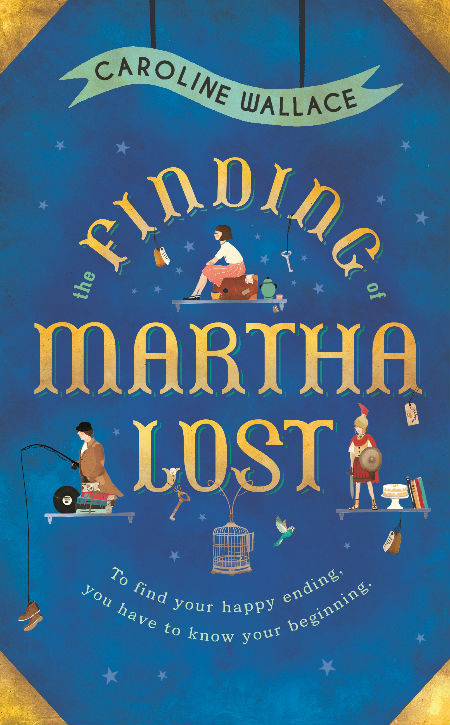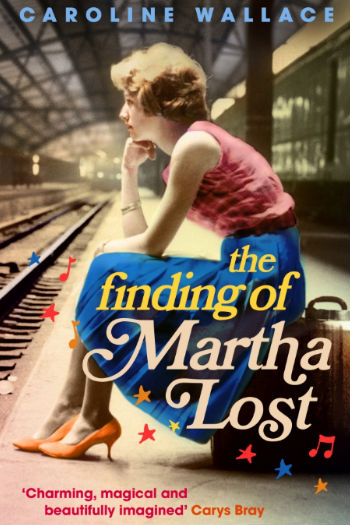
Compelling though many protagonists are, and they need to be if you’re going to make it to the end of the average novel, it’s a rare thing indeed to fall headlong in love with a lead character to the extent that you do with the whimsical, trusting but ultimately strong Martha Lost.
She is a remarkable creation in many ways and Caroline Wallace is to be commended for granting Martha Lost, who lives at Lime Street Station in Liverpool with her abusive adoptive mum simply referred to as Mother, the ability to be sweetly naive in one instance but wise to the human condition in another.
While she is given many adorably quirky qualities – she spins everywhere she goes, practices facial expressions in private before trying them out people like her friend Elisabeth in the coffee bar next door, and carries a large rock from the depths of the station whenever she ventures beyond its entry/exit – these are never allowed to subsume the more substantial elements of her character.
“I decide not to say the other things I like. I don’t say that I like Elisabeth or spinning or whistling or smiling. I don’t say that I like my library of found books. I don’t say I like it when someone sits down next to me on the bench opposite the lost property office and the way their weight makes the bench move up and down. I don’t say that I like it when balloons fly up to the rafters in Lime Street Station. I don’t say that I like the sign of the girl on the toilet door, because I think her dress is pretty. I don’t say that I like the ticking of a clock or when people cross two fingers to send a wish of good luck. I don’t say that I like silence or that I like slurping drinks or that I like the click of knitting needles or that I like the way water feels when it’s being sucked down a plughole.I keep all of these things in my head.” (P.203-204)
And whimsy aside, and it’s there in welcomingly large quantities, Martha is a 16 year old girl with some serious emotional baggage to her name, which to the credit of Elisabeth and newer friends like George Harris whose romantic interest she remains blissfully unaware of for much of The Finding of Martha Lost, never overwhelm or threaten the giddy joy of much of her life.
That it doesn’t is impressive given the fact that Mother, a firebrand, humourless fundamentalist Christian who believes the Devil lives in the basement below the Lost Property office she manages, routinely belittles, emotionally and physically abuses her and treats her as an unwanted hundrance to her rather soulless life.
So excoriating has been her belittling of Martha Lost – her surname is Mother’s constant reminder that her “daughter” was left as a baby at the Lost Property office and that she is unloved and unwanted, an untruth but one Mother is determined to perpetuate – that dear sweet Martha constantly blames herself for everything that goes wrong in her life and those of the people around her.
Bundle in some unsavoury influences on Martha throughout the novel and it’s a wonder she is as wonderfully upbeat and open to new experiences as she is, and that she continues to believe that life is a captivatingly enticing joy.
Much of that resilient, generous, expansive spirit comes from her “family” at the station, but also from her love of reading and the many wondrous possibilities it offers for a life not limited by Mother, the physical limitations of the station or her own in-built fears.

It is through this prism of literature that Martha makes sense of the world around her – many of these books have been left on trains and made their way to the Lost Property office, never to be reclaimed – and through which a mysteriously anonymous figure begins to communicate with her, offering the tantalising possibility that there is more to Martha Lost than Mother has led her to believe.
Throughout The Finding of Martha Lost, which speaks to the need all of us have for a strongly-shaped identity with which to face the world, Martha is led on a journey of discovery which calls into question many of the things she believed to be true.
And while a great many things are undone as Martha grows as a person, in strength of character and self-awareness and knowledge of the world at large, she never loses her pixie-like child-like belief in life’s magical possibilities.
In that respect, she is very much like Amélie, the protagonist of the film of the same name by Jean-Pierre Jeunet, who is quirkily sweet but also strong, sure of purpose and determined to make her mark on the world.
What makes The Finding of Martha Lost such an unparalleled joy to read is that Caroline Wallace deftly balances whimsy and the grim realities of life with a surety that allows Martha to emerge as a fully-formed young woman who, despite the many travails in her life, still has much to celebrate.
“And that’s when I can’t stop the tears. My knees become floppy, and I crumple to the floor. I curl into a tortoise again. It’s ridiculous really. I must look ridiculous. I have all the love I ever wanted and needed right here in this lost property office, but I’m covered in sadness. I don’t even think this is about [him], not really, it’s more that my time with these three amazing people, away from my true and only friends.” (P. 269)
Her friendships with the always-present, protective Elisabeth, George Harris who works as a Roman Soldier tour guide and is never out of costume, and the mysterious young homeless man William, all of whom become her inner circle and family in a way Mother is incapable of being, are the safe realm in which Martha can explore and understand the world, and with whose backing she is able to embark on the search to find her birth mother.
On every page, the delightful mix of whimsy and quirky outlook, gut-wrenching deprivation and loss, optimism and hope come to the fore, as this magical fairytale of a book – like every good fairytale, it is a mix of profound dark and effervescent light written with a lightness of tone and insightful understanding – wraps itself around you with the warm reassurance that no matter how grim life may be at times, that love, a sense of belonging and a growing sense of knowing exactly who you are and that you deeply matter to people, will see you through.
And you will feel profoundly sad leaving the absolutely wonderful Martha behind who, though sublimely happy as is the way of fairytale endings, is a vitally real presence you will want to have in your life over and over again.
Which means of course many re-readings of this beautifully redemptive tale, not something I would ordinarily consider even of those books I love, but which in this case is entirely warranted if only to be reminded how good life can be even if it doesn’t start out that way.